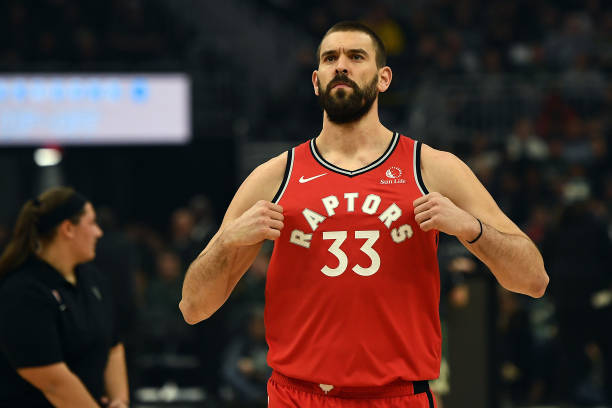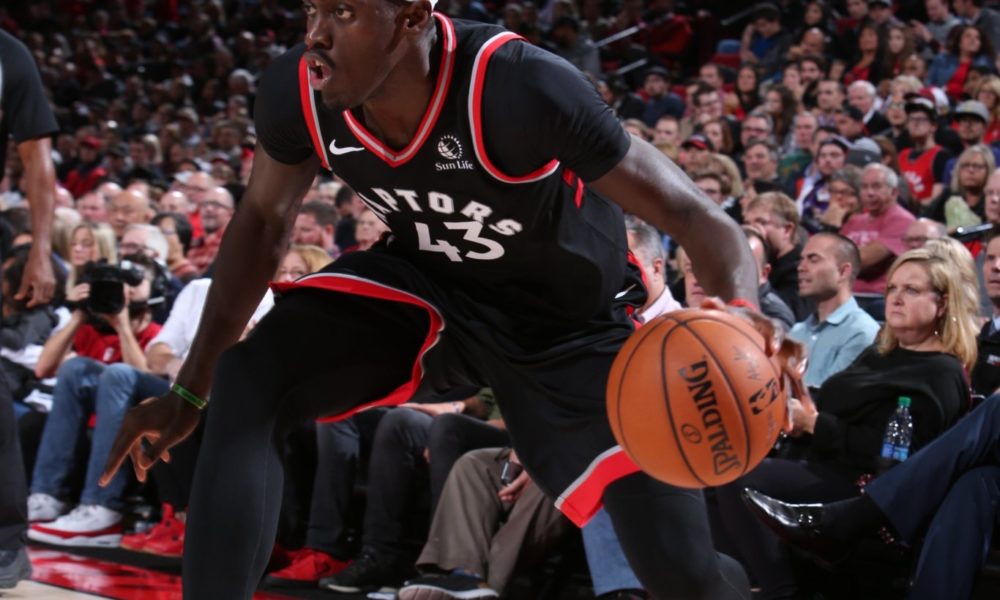Should we be worried about Marc Gasol?
There are two ways this story can go. Last year, Marc Gasol averaged only 9.1 points per game after he was traded to Toronto. He was indecisive, and though he shot well, and passed even better, he seemed perhaps a step slow, especially on the offensive end. In the playoffs, even though his scoring didn’t improve, he was an integral aspect of Toronto’s crushing defense, and the Raps won the whole thing. Though he may have been a stranger, he became a champion.
For the most astute observers, there were signs last year that Gasol would be fine. He shot 44 percent from deep after being traded to Toronto, and he led the team in net rating. The Raptors were the best 3-point shooting team in the league after acquiring Gasol. He was a man of opponents’ constant sorrow, even if he didn’t score the ball very much.
This year, Gasol has struggled again to put the ball in the basket. He’s shooting 7-for-20, or 35.0 percent, around the rim. That’s a bottom-10 mark around the league, and it’s the lowest for anyone who plays his position. Gasol is shooting better from deep, at 41.2 percent. But an inability to make a layup seems like a problem. It’s possible that he’ll turn it up when it matters and eat hearts in the playoffs. There is always the other road, the possibility that Gasol has aged out of his own game. That Gasol has struggled to score could be actually problematic, as the team had high hopes for him this year. Nick Nurse stressed heading into the season that Gasol would pick up some of the departing scoring slack.
“We really low-usaged Gasol last year and he’s a guy who can score, so we’ve gotta get it going through him a little more,” Nurse said on October 13 when asked who would pick up the slack for Kawhi Leonard. Nurse has promised a high usage rate for Gasol a variety of other times before and since then, but it hasn’t happened.
After Toronto’s inspiring win on Wednesday night against the Portland Trail Blazers, Gasol’s scoring sits at a lowly 6.7 points per game. He’s shooting 34.2 percent from the field and an eye-melting 28.2 percent from inside the arc. Gasol’s post-up game seems to have r-u-n-n-o-f-t. His efficiency is a far cry from his modest 2018-19 output. Then, he was too passive, even if he was effective when he tried to score. Now, he’s both passive and scoring poorly. Is it possible he’s hitting the point where smart players lose so much of their athleticism that they can no longer compete at the NBA level? I mean, the guy can barely dunk.
Some of the signs that Gasol remains useful are still there. His plus-minus, which isn’t an exact science, but is a reflection of whether your team plays winning basketball when you’re on the floor, is sky-high. At +82, he has the second-highest raw plus-minus on Toronto this year. Behind Rondae Hollis-Jefferson, Gasol has the second-highest net rating on the Raptors, at +11.1. That the Raptors win when Gasol is on the floor is basically a matter of course, seemingly no matter how he plays. He just can’t score anymore. It’s tough to see which tea leaves, predicting which path, are correct.
One argument could be that Gasol is saving himself for the playoffs. Like any savvy vet, Gasol knows when to put in the work and when to coast on forward momentum. One piece of key evidence is that the Portland game showed Gasol finally voting for yours truly. To end the first half, Gasol missed a triple and pounded the scorer’s table in frustration. He came into the second half focused and angry, seemingly hell-bent on finally playing well. He hit multiple 3s, set screens which resembled, physically and emotionally, the Berlin Wall; Fred VanVleet used Gasol’s Godzillian screens to hit multiple uncontested pull-up triples. Gasol blocked shots and stripped ball-handlers, and he played a brilliant second half of basketball on both ends. It’s nice to know that he still can.
We know that Gasol has something left in the tank that he doesn’t dip into for every game, but we just don’t know how much is in there. He may not be the perennial All-Star of old, but he can still be great.
Perhaps it’s good enough that Gasol’s defense remains excellent. He’s smart, protects the rim, and eats glass like it’s roasted gopher. He can still backbone a defense as suffocating as a flood. When healthy, Serge Ibaka is a fantastic scoring big in the pick-and-roll, spotting up, and cutting from the dunker spot. He’s one of the best bench bigs in the league, and that would be a wasted advantage if Ibaka were to be moved to the starting group. So it may be a case that when the key guys return from injury, Toronto continues platooning their centers, using Gasol as a starter and defensive specialist and Ibaka as a scorer in bench and transitional lineups. They would play roughly equal minutes. That was already the case before Ibaka’s injury, as Gasol averaged 25.6 minutes to Ibaka’s 24.4.
It seems, then, that Gasol has split the two paths. Faced with staying dominant or becoming too old to matter, Gasol is sometimes dominant and sometimes inconsequential. But the hope that Gasol could pick up more offensive slack has, like a beach bonfire when the rising sun starts to bleed into the air, dwindled to a dim flame indeed. It’s good timing that Pascal Siakam and VanVleet are ready this season to carry heavy offensive loads, as it’s unlikely that Gasol can ever again be relied upon for a cool 20 points. He can still dominate, in his own way. We saw that in the second half against Portland, maybe for the first time this season.
When the Raptors traded for Gasol, it seemed he was still a scoring maven. He wasn’t, but he was good enough for a title. Who knows what surprises he still holds. The Raptors may yet find a great fortune in Gasol, even if it is not the one they seek.



